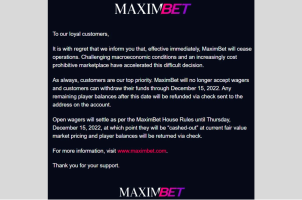Indiana Sportsbook Handle Drops in January, Revenues Up from Year Ago
Posted on: February 13, 2023, 09:24h.
Last updated on: February 14, 2023, 02:47h.
Indiana’s sportsbooks saw betting traffic decrease substantially in January, the first month for legal sports betting in neighboring Ohio. However, it wasn’t all bad news for Hoosier operators.

The retail sportsbooks and online wagering apps reported a handle of $427.2 million and adjusted gross revenues (AGR) of $36.5 million for the first month of 2023.
The January handle was down about 1% from the December handle of $431.4 million, and revenues fell by 14.5% from the $42.7 million the operators collected that month.
However, compared to January 2022, last month’s handle fell by more than 14% from the all-time monthly record handle of $500.1 million the state produced a year ago. Despite that larger handle, though, Indiana’s sportsbooks saw revenues increase by almost $886,000 last month.
Indiana taxes AGR at 9.5%, meaning the state received $3.4 million in revenue last month.
Retail Sportsbooks Near Cincy Take Hit
With sports betting legal in Ohio as of January 1, it meant that several operators in Indiana would likely lose a good chunk of their business. That’s especially true for retail sportsbooks in the state’s southeast corner, the closest region to the Cincinnati market.
Besides 16 mobile apps and hundreds of sports betting kiosks at lottery retailers in Ohio, there are four retail sportsbooks available in Cincinnati: ones at Miami Valley Racing and Gaming and Hollywood Gaming at Dayton Raceway. Those will likely serve customers who were previously traveling to Indiana to make their bets.
And Indiana retail sportsbooks in the region did see big drops. Hollywood Lawrenceburg, which is located about a mile away from the Ohio state line, reported a handle of $6.5 million last month. That’s compared to a handle of $13.6 million in December 2022 and $13.2 million in January 2022.
Belterra Casino in Florence, located about an hour south of Cincinnati, had a handle of $492,111 last month. That was down from $649,717 in December and $725,092 in January 2022.
Horseshoe Indianapolis in Shelbyville, located about an hour northeast of Cincinnati, reported a handle of $862,292 last month. That was down from the $1.2 million in bets it took in December and the $1.1 million it took a year ago.
Not all operators saw their handles take a hit. FanDuel and DraftKings, the two largest players in Indiana, saw betting traffic increase slightly from December. FanDuel’s January handle of $142.3 million was up from the $137.8 million it accepted in December, while DraftKings went from $134.8 million in December to $139.6 last year.
Parlaying Success in Indiana
So, if Indiana’s sportsbooks took less money in wagers, what might explain why last month was more profitable than a year ago? The answer to that question is likely an increase in parlay wagers.
US sportsbooks have emphasized parlay wagers, or bets that include multiple legs. Those bets typically offer more lucrative odds, but they require the bettor not to miss on any leg. As a result, sportsbooks tend to win a higher percentage of parlay bets compared to single wagers.
Indiana does not break down sportsbook revenue by wager types, but it does break down unaudited handle by bets placed on football, basketball, baseball, other sports, and parlays. Last month, nearly 30% of all money wagered in Indiana sportsbooks, $124.7 million, was bet on parlays. In December, that share was 27.6%, or $119 million, and in January 2022, the $122.6 million wagered on parlays equaled less than a quarter of the money wagered in the state.
So, as long as bettors continue betting more on parlays, Indiana will likely not see tax revenues suffer even as sports betting handles continue to drop.
Related News Articles
Betr Signs Indiana Market Access Deal with Caesars Southern Indiana
Indiana Sportsbooks Post Strong Handle, Revenue Totals in October
MaximBet Closes US Sportsbook Operations, Cites ‘Cost Prohibitive Marketplace’
Most Popular
Mirage Las Vegas Demolition to Start Next Week, Atrium a Goner
Where All the Mirage Relics Will Go
Most Commented
-
Bally’s Facing Five Months of Daily Demolition for Chicago Casino
— June 18, 2024 — 12 Comments
















No comments yet